Dental Implants – Henderson, NV
The Closest Thing to Your Natural Pearly Whites
Today, dental implants have become a more popular choice than ever for replacing missing teeth or upgrading an unsatisfying denture – and for good reason. Dental implants look and feel just like natural teeth, allowing you to eat what you want, speak clearly, and smile with confidence. At Dental Excellence: Dr. Brett Noorda, Dr. Brett Noorda has the advanced skill and exceptional levels of experience needed to create incredible results for patients. Dr. Noorda has undergone extensive continuing education and has earned a Fellowship from the elite ICOI (International Congress of Oral Implantologists). If you’re interested in dental implants in Henderson, contact our dental office today to schedule your consultation!
Why Choose Dental Excellence: Dr. Brett Noorda for Dental Implants?
- Fellow of the International Congress of Oral Implantologists
- Start-to-Finish Dental Implant Treatment Under One Roof
- Dental Sedation Available for Anxious Patients
What Are Dental Implants?

Dental implants are small posts that mimic the root structure of lost teeth. To accomplish this, they are surgically inserted underneath the gumline and directly in the jawbone. Since they’re made of biocompatible materials like titanium, dental implants are able to merge with the existing bone tissue. At that point, they’ve forged a bond powerful enough to support any number of replacement teeth by anchoring a dental crown, bridge, or denture on top. This comprehensive structure gives dental implants a durability, longevity, and strength that is a world above that of traditional tooth replacements.
The 4-Step Dental Implant Process

When you visit Dental Excellence: Dr. Brett Noorda for a dental implant consultation, Dr. Noorda will go over each step of the process with you. We’re able to offer complete dental implant service under one roof (unlike other practices that would have to send you to a specialist for implant surgery), so you’ll have a familiar, friendly dental team by your side during each and every one of these steps. The following outline covers the basics of the process that every patient can expect to follow.
Initial Dental Implant Consultation

Before we do anything else, we need to confirm your candidacy for dental implants. Some patients can get implant posts right away while others require bone grafting and other forms of preliminary work before the surgery can be performed. At your initial consultation, we’ll use cutting edge dental technology to evaluate your mouth and your dental structures to see what steps, if any, need to be completed before we can schedule the next step of the process.
Dental Implant Surgery

Since dental implants need to be inserted into your jaw, they do require surgery. Compared to other surgical procedures, dental implant surgery is actually quite simple; we open the gum tissue and place the implant posts at precise, carefully chosen locations at an angle that lets it fully integrate with the tissue without damaging any underlying nerves. After your gums are sutured shut, a protective cap is placed on each implant to keep them safe during the next phase of treatment.
Dental Implant Osseointegration & Abutment

Your dental implants won’t be ready to support a permanent restoration right away. They need time to form a strong bond with the jawbone via osseointegration. This takes about 3 to 6 months (the exact number will vary depending on how many implants you received as well as your body’s natural healing capabilities). Any post-surgical pain and swelling should fade after just a couple of weeks, so if you’re still noticing such symptoms once months have passed, call our office immediately.
After osseointegration is complete, you’ll return to our office for a smaller surgical procedure. We will attach a small piece called an abutment to each post. The abutment is what secures the final personalized restoration to the dental implant, so it needs to be in place before we can start taking the final impressions.
Delivery of Dental Implant Restoration(s)

“Restoration” is another word for replacement teeth, and it can refer to a crown, dental bridge, or dentures depending on your needs. Each restoration is designed based on impressions of the patient’s natural smile and made from materials that match the color and light-reflecting properties of your natural enamel. At your last appointment, we can make some last-minute adjustments to ensure that your new teeth are as natural-looking and comfortable as possible before we secure them to the abutments. Once you walk out of our practice with your new smile, you’ll find that most people can’t even tell the difference between your original teeth and your implant restorations.
Benefits of Dental Implants

By choosing dental implants as your tooth replacement, you’ll enjoy a wide range of advantages that bridges and dentures alone just can’t deliver. Since implants recreate the entire structure of the lost tooth, they’re able to essentially fulfill all of the functions of real teeth. Eventually, you might even forget which of your teeth are natural and which are implants! Let’s explore some of the benefits of dental implants in Henderson that you can look forward to.
Day-to-Day Benefits

- Enjoy a varied diet – Traditional dentures only restore about 20% of your chewing function and can cause patients discomfort or embarrassment by slipping. Implant-supported teeth, on the other hand, can replace 75% or more of healthy tooth function, allowing patients to eat a wide range of crunchy and chewy foods, such as fresh fruits and vegetables.
- Drink your favorite beverages – Another drawback of conventional dentures is that their shape often warps when they’re exposed to hot beverages like tea, coffee, or hot chocolate. Luckily, dental implants in Henderson should retain their shape at every temperature, so you can enjoy these drinks to your heart’s content.
- Smile confidently – The dental crown, bridge, or denture that Dr. Noorda places on top of your implants will look and feel completely natural. You’ll feel confident sharing your smile in almost every personal and professional situation.
Health Benefits

- No irritated gums or sensitive teeth – Poorly fitting dentures can cause sores and irritation as they rub up against the gums. Dental bridges require two of your remaining teeth to be filed down, making them more sensitive over time. Since dental implants are self-supporting and firmly embedded in the jaw, they prevent both of these problems.
- Healthier jawbone – The roots of your natural teeth keep your jawbone strong by stimulating it every time you bite or chew. After tooth loss, the bone starts to deteriorate. Dental implants are the only tooth replacement that brings back the roots, preventing your jawbone from weakening.
- Decreased risk of certain medical conditions – Tooth loss has been linked to an increased risk for health conditions like heart disease and diabetes. Because dental implants function like real teeth, it’s not a stretch to assume that they reduce these risks.
Long-Term Benefits

- Lasting solution – Traditional tooth replacement options need to be repaired or replaced every five to seven years on average. Once your implant dentist in Henderson has placed your new pearly whites, you can expect them to last for several decades. In fact, most dental implant patients maintain their rebuilt smiles for the rest of their lives!
- Lower dental bills – Bridges and dentures have a lower initial price than implants, but they’ll actually cost you more in the long run. Not only will you have to get these prosthetics replaced frequently, but you’ll also have to purchase specialized products like cleaning solutions and adhesives. Dental implants, in contrast, are a one-time investment that will end up paying for itself several times over.
Who Dental Implants Can Help

Dental implants in Henderson are a great tooth replacement solution for patients in all kinds of situations. Whether you’re missing a single tooth, several consecutive teeth, or both arches, this customized treatment can be tailored to meet your unique needs and dental goals. Even if you’re not a great candidate for dental implants right off the bat, our team at Dental Excellence: Brett Noorda will do what we can to help you get there.
Who Is a Good Candidate for Dental Implants?

While many patients who see us concerning tooth loss situations are good candidates for dental implants, that’s not always the case for everyone. Some situations may require preparatory procedures to help get your oral health back on the right track before you can successfully undergo implant surgery, while others may require collaboration with your primary care physician. Here are a few scenarios in which you may not be a good candidate for this procedure right away:
- Jawbone erosion that prevents the implants from properly fusing with your bone.
- Immunocompromising medical conditions, including diabetes, which need to be regulated before you may undergo treatment.
- Gum disease that has compromised the health of the foundation of your dental implants.
Our team will work with you to plan any gum disease treatments, bone grafts, sinus lifts, or other procedures you may need before moving forward with dental implant surgery. After you’re deemed a good candidate, we’ll walk you through the steps that we’ll take to restore your smile.
Missing One Tooth

If you’re only missing one tooth, your implant dentist in Henderson can place a single implant post in the gap. The post is then topped with a lifelike crown that looks, feels, and functions just like the rest of your natural smile.
Missing Multiple Teeth

To replace several missing teeth in a row, we can install an implant on either end of the space in your smile. These posts are used to support a dental bridge. Unlike traditional bridges, implant bridges avoid the need to place stress on your natural teeth because the posts can support themselves.
Missing All Teeth

Using four to eight implants per jaw, we can solve the problem of total tooth loss by anchoring a full denture. Because of their unmatched stability, implant dentures not only last much longer than their traditional counterparts, but they also avoid embarrassing and uncomfortable slippage.
Understanding the Cost of Dental Implants

- Linda K.
I reached out to Dr Noorda’s office because I had a tooth that was bothering me and my dentist was on vacation with no back up. They squeezed me in for the next morning. Dr Noorda and his staff were so friendly. Dr Noorda spent time with me and explained my options. I will definitely be returning to Dr Noorda’s office for my future dental procedures.
Every patient has different needs, so there is no fixed cost of getting dental implants. While implants typically have a higher cost upfront than traditional bridges or dentures, these restorations usually have to be replaced periodically. Dental implants, on the other hand, can last a lifetime with proper care, so they could actually save you money in the long run!
Unfortunately, the cost of the implant posts themselves and the surgical placement procedures are not typically covered by dental insurance plans. However, the majority of insurance providers do offer coverage for preparatory procedures like tooth extractions as well as the restorations. We are also happy to work with third-party medical and dental financiers like CareCredit to provide low- and no-interest payment plans to fit the cost of dental implant treatment into almost any patient’s budget.
Types of Dental Implants
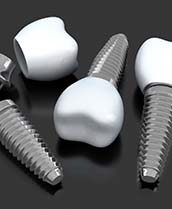
The cost of implant treatment often varies depending on the complexity of the case and how many implants are needed to replace a person’s missing teeth.
There are three main types of dental implants:
- Single Tooth Implant – Fill the gap in your smile with a single implant and custom dental crown.
- Implant Bridge – Replace two or more consecutively missing teeth with a pair of implants.
- Implant Denture – Four to six implants can help replace an entire row of missing teeth.
What Are the Stages of Dental Implant Treatment?
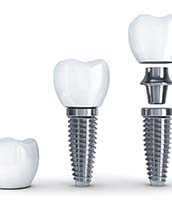
Dental implant treatment is typically completed in several steps over the course of a few months. Each step plays an important role in the overall process and contributes to the final cost:
- Initial Consultation – As an experienced implant dentist, Dr. Noorda will first examine your teeth and mouth before creating a personalized treatment plan. He will also take impressions of your smile to send to the dental lab.
- Surgical Placement – Placing dental implants involves making a small incision in the gums and surgically inserting the implant post into the jawbone.
- Osseointegration and Abutment Placement – Over the next several months, your implants will fuse with the surrounding bone. Before your restoration is placed, Dr. Noorda may attach an abutment onto your implants. An abutment is a connector piece that helps secure a crown, bridge, or denture to an implant.
- Smile Restoration – Once your implants have fully healed, Dr. Noorda will securely attach your new teeth onto your implants, restoring your smile and dental function.
Are Dental Implants Worth the Investment?

Dental implants offer a range of benefits that other tooth restorations just cannot match, including maximum stability, restored chewing power, and natural appearance. For these reasons alone, dental implants would be worth the investment. However, implants are also one of the longest-lasting tooth replacement options. With proper care, dental implants can easily last for decades – or maybe even the rest of your life! When you consider the fact that traditional dentures and bridges must be replaced every few years, you can see how dental implants can be the most economical way to restore your smile.
Does My Dental Insurance Cover Dental Implants?

Many dental insurance plans do not cover dental implants, but they often cover many of the related costs. For instance, you may be able to count on your dental insurance to pay for the initial consultation for implants and reduce the costs associated with preliminary treatments such as a bone graft, sinus lift or gum disease therapy.
Even if you do not have dental insurance, we can still help you manage the costs associated with implant treatment. We are proud to partner with CareCredit and Lending Club, which offer low- and no-interest dental financing plans to fit virtually every budget!
Dental Implant Technology
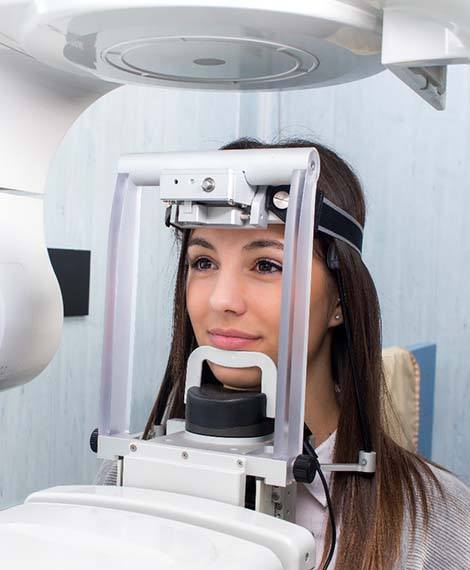
At Dental Excellence: Dr. Brett Noorda in Henderson, we have always been dedicated to delivering safe, efficient dental services by utilizing the latest, state-of-the-art technology. When it comes to advanced treatments like dental implants, we are even more reliant upon advanced instruments to deliver effective treatment options to restore any number of missing teeth. If you’re interested in learning more about dental implants, how they work, or the dental implant technology in our Henderson, NV dental office, get in touch to schedule your tooth replacement consultation today. We’ll be happy to answer your questions and help you find the best treatment to restore your smile’s form and function.
Why Is Dental Technology Important?
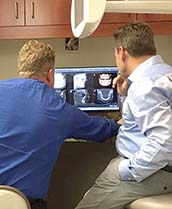
Technology has transformed almost every aspect of our daily life in the last two decades. Keeping up with the innovations in dental technology has allowed the Dental Excellence: Dr. Brett Noorda team to offer exceptional quality dentistry services in complete comfort. Even the most advanced dental treatments are faster, safer, and more efficient, thanks to the use of state-of-the-art technology. When it comes to complex dentistry treatments like dental implant-supported tooth replacement, the use of technology is essential. It allows us to precisely plan every aspect of your dental implant procedure and deliver flawless results in a shorter timeline using even higher quality materials and yielding life-changing results.
Digital Dentistry
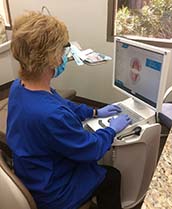
Digital dentistry may include digital photos of your smile, traditional two-dimensional and comprehensive 3D X-rays, and impressions of your prepared teeth. In addition to being immediately viewable on our chairside computer monitors allowing you to see and better understand your treatment plan, we can also instantly transfer these digital images to our skilled dental lab team, so our lab technicians can start creating your dental restoration right away.
CT Cone Beam Technology
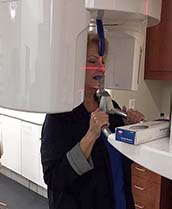
In order to give us the most accurate image of your full oral health and function, we use a 3D CT cone beam scanner. This advanced digital X-ray technology shows a 360-degree view of an individual tooth, dentition, your sinuses, and even nerves in the face. This allows us to carefully plan your dental implant treatment to avoid nerve tissue and utilize the naturally denser parts of the jawbone to provide support for your implant posts.
Guided Dental Implant Surgery
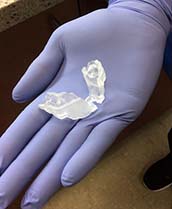
Using our 3D scan and specialized computer software, we can create surgical guides. These tools ensure that we precisely position your implant posts. On the day of your implant placement procedure, the guides are placed in the mouth, and we simply need to carefully position the implant posts according to our precise plan.
Dental Implant Failure & Salvage

Did you know dental implants have an impressive success rate of over 95%? Despite that, rare occurrences such as infection, trauma, or other unforeseen issues can lead to implant failure. If you experience any unusual discomfort or notice looseness in one of your implants, it's important to act quickly to protect your newly restored smile. After giving us a call, our team will schedule you for an appointment to assess the situation and take all necessary steps to restore your dental implants.
Dental Implants FAQs
Can dental implants help my denture fit better?
Absolutely. Even the most well-fitted quality traditional partials and full dentures can only restore about 20% of healthy chewing function. This significantly limits diet. It is also uncomfortable for many patients who struggle to adjust to speaking and smiling with a denture that doesn’t feel natural. Implant dentures look, feel, and function much more like healthy, natural smiles. Additionally, implant dentures restore 70% or more of natural chewing function. That means you can consume all of your favorite foods with complete confidence.
What technology do you use to place dental implants?
Our fully digital dental office makes your dental implant placement and restoration comfortable, fast, and effective. We begin by using full face digital x-rays during the treatment planning process to ensure precise placement of your dental implant posts for optimal success. Once it’s time to create your custom restorations, we use digital impressions to provide precise plans that lead to better looking and feeling replacement teeth. We can also utilize our CEREC same-day dental restoration system to create dental crowns and bridges right away.
What dental implant training does Dr. Noorda have?
In addition to completing his doctoral studies in dentistry, Dr. Noorda has completed numerous advanced training programs. That includes training in the safe and successful surgical placement of dental implants. Additionally, Dr. Noorda is certified in basic life support and advanced cardiac life support as well as intravenous (IV) sedation.
How can I make dental implants affordable?
We know it can be frustrating for patients that the cost of dental implants is often not covered by their dental insurance. Our team is hopeful that more dental insurers will begin offering this coverage in the coming years. In the meantime, we can help you fit the cost of implants into your budget. The main way we help is by billing for the cost of the procedure in sections.
We don’t complete the entire implant placement and restoration process in a single visit, and you won’t need to pay for the entire cost up front. Additionally, while your insurance provider will not likely cover the cost of the dental implants or their placement, insurers do usually cover part of the cost of your restorations as well as other services like tooth extractions or dental sedation.
We will maximize this coverage to help patients offset the costs of treatment. If your employer offers flexible spending accounts (FSAs) or health savings accounts (HSAs), these funds can often be used for the price of treatments. Finally, we are happy to work with CareCredit and other third-party financiers to provide low- and no-interest payment plans.
Dental Implant Post-Op Instructions

Once your dental implant surgery is complete, Dr. Noorda will provide helpful guidelines that are to be used while you heal at home. These dental implant post-op instructions are designed to minimize the potential for complications and allow for a more comfortable and successful recovery. From what you can expect in terms of normal symptoms to what you should eat and avoid, we encourage you to review the following information and let us know if you have any questions.
What to Do Directly After Dental Implant Surgery

Immediately following your procedure, you will need to make sure that someone is available to drive you home. The anesthesia you receive will require some time to wear off, so you shouldn’t expect to be able to drive after your appointment. While at home, it’s best to focus on getting adequate rest and making sure you do not dislodge the blood clot that is necessary for proper healing.
If you want to make sure that you do not develop a dry socket, which can be painful, avoid:
- Instead, swallow your saliva or use a tissue.
- Using a straw to sip any kind of beverage.
- Smoking or using tobacco products.
- Touching the wound with your finger or tongue.
Attempting any of these can cause the blood clot to become dislodged. Should a dry socket form, you will need to call our office and schedule an appointment.
Common Side Effects

It is common to develop some side effects after returning home from your dental implant surgery. Although you will feel nothing during the procedure, you can expect there to be some mild soreness once the anesthesia wears off. This can be remedied with the help of an over-the-counter pain reliever. Make sure to take it as directed.
Also, minimal bleeding is expected for several days, so you will need to use clean gauze and light pressure to reduce the flow. Finally, do not be surprised if the swelling you experience does not go down for more than a week. This is normal but can be lessened by using a cold compress.
Diet

While you may not feel like eating much immediately following your procedure, you will begin to develop an appetite over time. It’s best to stay away from hard, crunchy, sticky, or highly acidic foods and beverages during this time, as they can irritate the surgical sites.
Instead, adopt a soft food diet for several days that includes mashed potatoes, yogurt, oatmeal, pasta, scrambled eggs, warm soup, and ice cream. Consuming these foods, and drinking plenty of water, will allow your mouth to heal without the added pressure that chewing and biting down can cause.
Health & Oral Hygiene

You will need to wait a full 24 hours before resuming your oral hygiene routine. The following day after your procedure, you can begin to brush your teeth normally, but you’ll need to be careful when cleaning near your implants. The same is true for flossing, as you do not want to irritate these areas during the healing process. When rinsing your mouth, make sure to stay away from any products that contain alcohol and instead use a saltwater rinse two or three times a day. This will help encourage faster healing and flush out anything that might be harmful to your oral health.
What to Do After Your New Teeth Are Attached

After your custom restoration is attached and secured in place, you should have no additional bleeding or swelling. You may notice some slight gum sensitivity, but this should not last long. An over-the-counter pain reliever can help minimize this sensation and allow you to enjoy life with your new set of teeth.
Maintaining & Caring for Your Dental Implants
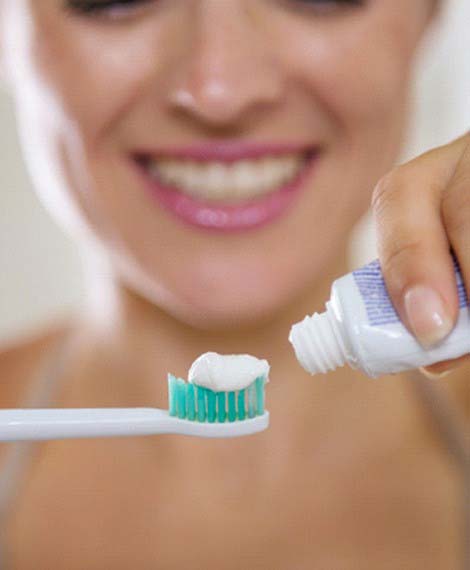
Dental implants are remarkably durable, with the potential to easily last for 30+ years. That said, they still need regular care in the same way that natural teeth do. After all, you’ll want to protect the investment you made in your smile! By following these five simple tips, you can give your dental implants in Henderson the strong foundation they’ll need to last a lifetime.
Make Oral Hygiene a Priority

Unlike with traditional dental bridges and dentures, oral hygiene with dental implants is quite simple. It essentially involves the same steps you would take to keep natural teeth clean – brushing twice a day, flossing every night, and rinsing with mouthwash on a regular basis. Taking the time to keep your mouth clean will prevent bacteria from accumulating in your gums and jeopardizing your implants.
Eat a Healthy Diet

Maintaining a nutritious diet is another key component of dental implant care in Henderson. Luckily, dental implants make this incredibly easy because they restore almost all of the biting and chewing force you had with your original teeth. Eating lean meats and fresh fruits and vegetables should be no problem.
You should also be careful to only have sweets in moderation. There’s nothing wrong with enjoying a bowl of ice cream from time to time, but overindulging in sugar increases your risk for gum disease and decay in your remaining teeth, both of which could threaten the success of your dental implants.
Break Bad Habits

As strong as the titanium that makes up your implant is, it can still be damaged by bad oral habits. Chewing on pens or pencils, opening bottles with your teeth, and biting your fingernails can easily spell disaster for your dental implants. Additionally, we cannot recommend enough that you quit smoking before getting dental implants, and especially after the surgery. Tobacco interferes with the osseointegration process, which may cause your implants to fail.
Protect Your Dental Implants

Just as you would wear a helmet while playing contact sports to protect your head, you should also protect your smile. As a trained implant dentist in Henderson, Dr. Noorda can help by making you a custom mouthguard. This comfortable tray sits over your teeth to shield them from injury. On a similar note, you should also ask us about a nightguard if you have a teeth grinding habit. Long-term grinding and clenching can wear down or even fracture your implant restorations.
Schedule Regular Dental Checkups

Even patients with dental implants still require routine checkups and cleanings every six months. Although dental implants cannot become decayed, infection or damage in the surrounding teeth or gums can result in serious problems for the implants. By visiting us twice a year, Dr. Noorda can make sure your implants are still in great condition. If he spots any signs of trouble, he can treat them before any major issues arise.
